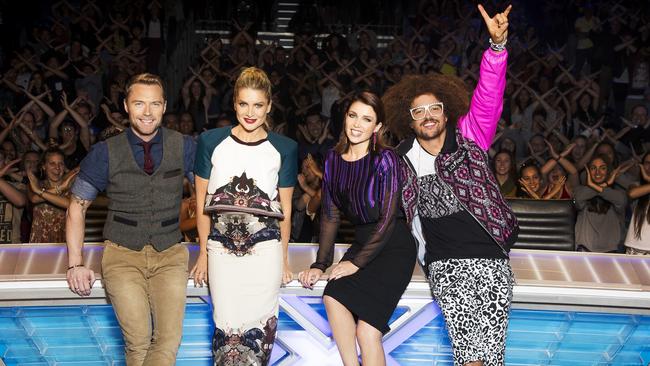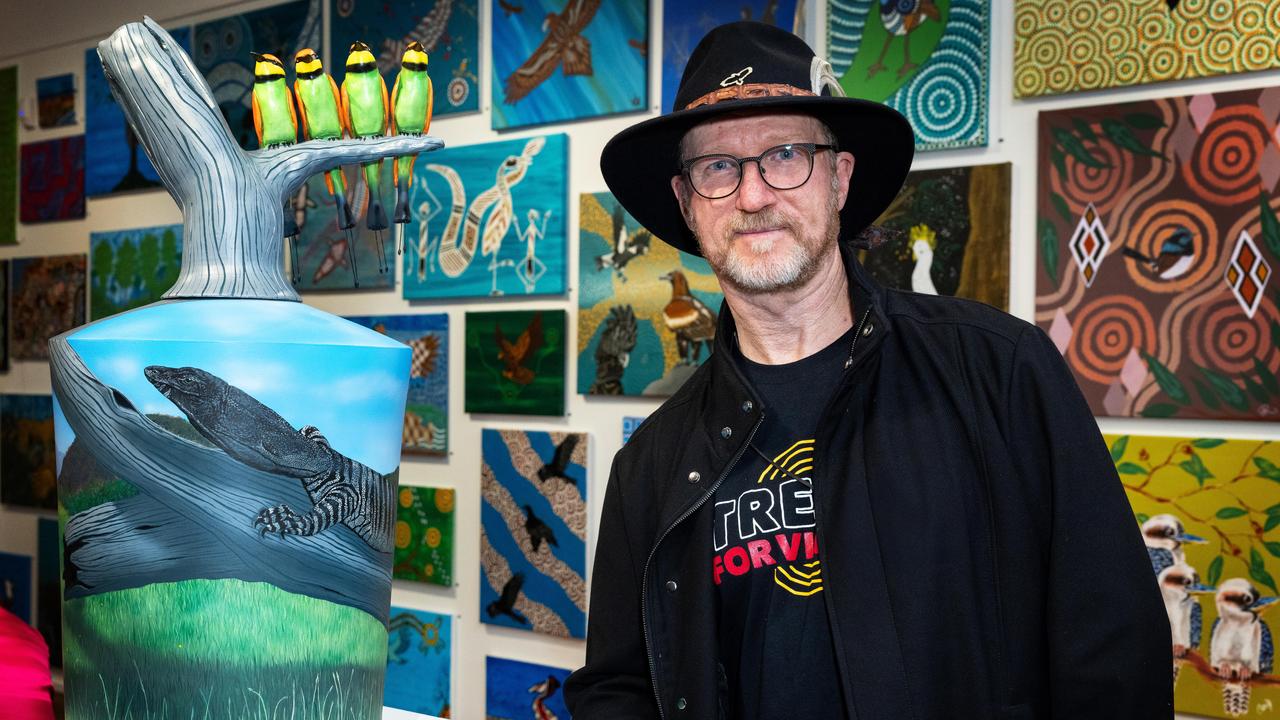X-Factor keeps it real for talent show contenders
WHAT separates the good reality talent shows from the bad is highlighting humanity, not humiliation.

TELEVISION has always loved the convergence of commercialism, ratings popularity and non-scripted shows and much of what these days we call reality TV can be traced to existing highly durable formats, prior moments in its history. The popular quiz shows of the 1950s represent an early incarnation of highly profitable programming that hinged on the appeal of real people placed in dramatic situations, often charged with emotion, with unpredictable, sometimes capricious outcomes.
What ties together all formats is their professed abilities to provide us with an immediate, voyeuristic and yet playful glimpse into what some theorists (if you’re interested read the definitive Reality TV: Remaking Television Culture by Susan Murray and Laurie Ouellette) call the “entertaining real”. It now dominates prime-time TV, talk shows and quiz shows on the verge of extinction, though Channel 10 with a dying breath has revived the ancient Family Feud, once hosted by spectral echoes from TV’s past such as Darryl Somers and Bert Newton.
But as the genre has proliferated we’ve wised up to the tricks, the legerdemain of its practitioners and we’re much more savvy and sceptical as to how much is actually “real”.
We don’t believe these shows are “authentic” and we don’t really care anymore — what really fascinates us is the space that exists between reality and fiction and we engage with each format in the same way we do with a thriller, trying to outguess the authors. Reality TV promises us revelations and insights into the lives of others, even as it withholds and subverts full access to them. It’s all so unstable and untrustworthy that we are encouraged to test out our own notions of what’s real and what isn’t, demanding new levels of cultural participation on the part of viewers.
This is certainly the case with The X Factor, that entertaining hotchpotch of game, talent, variety and reality show that returned last week to Seven: it’s shiny production values seem astronomically expensive. It’s little wonder that the also costly A Place to Call Home got the chop, even though it’s one of the classiest and most intelligent dramas commercial TV has locally produced.
Last week’s X Factor episodes showcased drama too, presenting the prerecorded audition stories, centred on the three star performances — already packaged, their “journeys”, the word beloved of reality TV authors, white-boarded by the show’s producers — of the chosen ones off to “boot camp”.
Judges Ronan Keating, Natalie Bassingthwaighte, Dannii Minogue and the oddly monikered but highly astute Redfoo (actually the son of Motown Records founder Berry Gordy Jr) will put them through a series of challenges to see if they are versatile enough to take on different musical genres and if they have the enigmatic “X Factor”. No-one knows what it is or can explain it but they all know it when they see it.
One thing is certain though, as Annie Lennox said, “You wouldn’t find a Joni Mitchell on X Factor; that’s not the place. X Factor is a specific thing for people that want to go through that process — it’s a factory, you know, and it’s owned and stitched-up by puppet masters.”
She’s right: it’s the process, especially the auditions. They always turn into psychodrama, everyone desperately seeking “the moment that changes everything” as they did last week, and again over this weekend as the auditions continue. They are the show’s most compelling dimension. Just when you think it has disappeared from the screen, the early episodes reveal something of the power of TV democracy, how electronic spectacle and humanness can accidentally interact in such a brutal commercial setting.
This year the show’s electronic caravan blitzed Melbourne and Sydney. The audition weeks represent a huge investment as 112,000 hopefuls were somehow wrangled, according to production sources, across two days of recording in Melbourne and four in Sydney; two sessions a day with apparently 4000 in each tryout.
It’s almost unimaginable but you’ll see from the massive groups of waiting people, some carrying instruments and others practising in the swooping crowd shots outside the staging area, it’s more than possible. Each session took place over four hours and there were up to 50 cameras involved — onstage and behind the scenes — in somehow capturing the required shots for each episode. In the end there were 281 filmed auditions before the judges at roughly — very roughly to judge from some highly comic scenes of wannabes given the bum’s rush by one or other of the judges — 50 per day. One wonders just how the producers of reality TV shows cope with so much footage in the time between shooting and the finished product going to air.
I went backstage a few years ago and into the control room of Big Brother, from which more packaged hours of TV emerged than from most TV networks. It was a control room on full alert, a Star Trek-style of central instrumental facility with dozens of flashing, constantly shifting digital screens on a long concrete wall. Watching and operating were several rows of laptop-connected directors, producers, recordists, script assistants, network executives and remote camera operators.
Some of them searched for narratives and storylines among the hours of streaming digital images coming from the house along thousands of kilometres of wire. Each one of the technicians blazed with vigour, enthusiasm and commitment, no one seemingly a day over 30, staring at the screens with that peculiar kind of fatigued concentration television control rooms generate. “We start out with a blank page every day and make a show out of that,’’ producer Kris Noble told me, explaining the acolyte-like intensity that shimmered around the production.
The X-Factor producers have more time but still it must be harrowing to create this first six hours of the show capturing the best moments of the seemingly countless auditions. It’s a brutal winnowing process. And in these early episodes the show celebrates diversity, a crazy cacophony of voices, the entire compass of tones representing not only thousands of kids singing alone in their bedrooms in search of their X Factor dream but disaffected pros looking for a second chance. They look at the judges table with that mixture of curiosity, determination and, in the cases of some of those veteran performers, a sense of distant hurt.
Eventually these knockabout tryout grabs, an addictive merger of high and low culture, reality and fantasy, coalesce into one ongoing, coherent and engaging who’s-going-to-win narrative as X Factor accelerates to the finale.
It’s the little moments when singers struggle — trying to find expression, singing bum notes or showing their disdain insolently to the judges; when their domestic daydreams collide with reality — that make for entertaining TV.
Ultimately, that’s what separates the typical poor reality shows based on embarrassment from the special ones: the willingness to point out that most of us live in places where we’re constantly tripping up against what we yearn for and falling over our expectations.
Sure, much of the show is scripted, in the sense that segments are structured, contrived and rehearsed, and expert producers try to prevent mistakes — or encourage them — but the thrill of the unexpected is still possible. I actually got goose bumps watching 14-year-old Marlisa Punzalan and her compelling version of Yesterday; blonde Reigan Derry, with that ethereal Emmy Lou Harris voice, all heartbreak and lament, able to ring pain from each syllable, is going to break hearts too. Now they were “real”, at least in performance, even though the backstories of their personal struggles were tightly authored.
Watching Derry, I was reminded of something the great Sydney singer Shauna Jenson once told me. “Just be in the game,” she said. “Have no interest in what people think about you.” This is the only way to survive for the long haul according to Jensen; her advice to those who want to sing was simple: do it for yourself first. “If you are singing in a club, for every three people who are sitting there, one is going to hate you, one will love you, and the other will say: ‘There was a singer?’”
The X-Factor, Sunday, Monday, Tuesday, Seven, 6.30pm


